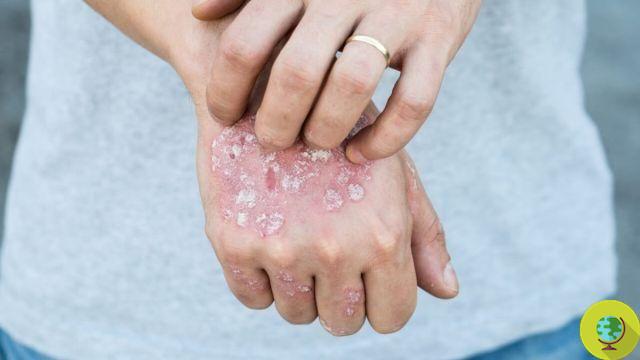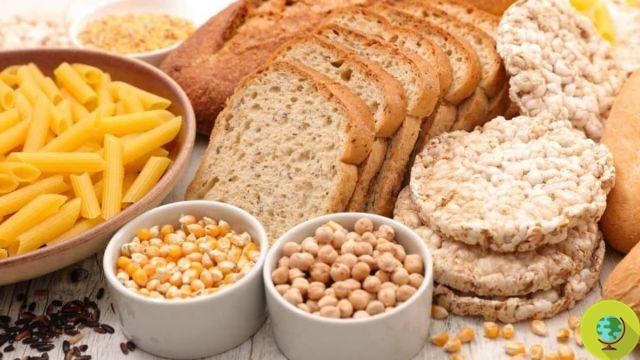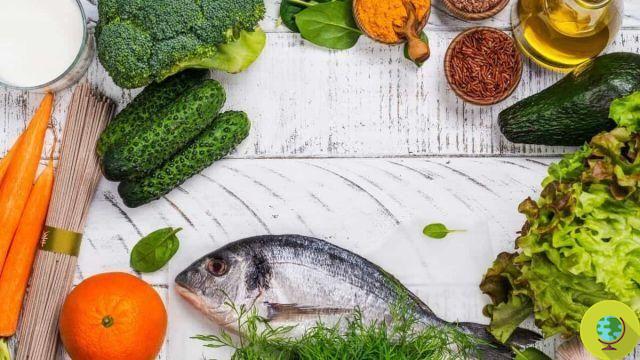There are many treatments available for psoriasis, but what if you could relieve symptoms by simply changing your diet?
Don't store avocado like this: it's dangerousThere are many treatments available for psoriasis: from skin ointments to drugs that alter the immune system.
What if the symptoms of this condition could be alleviated by simply changing thesupply?
In fact, diet may play a more important role than we think in how our bodies handle inflammation.
Let's talk with Dr. Marina Fantato del Psoriasis Center Milan. It will give us information on which foods to eat and which to avoid if you have psoriasis.

Index
What is the relationship between psoriasis and diet?
Psoriasis is one chronic autoimmune skin disease. The body mistakenly attacks its own tissue. That is, it begins to produce excess skin cells that generate plaques on the skin itself. Plaques are red, scaly patches that can be itchy or painful. Psoriasis is sometimes accompanied by psoriatic arthritis, an inflammatory condition of the joints.
None of these conditions are caused in full by what we eat. But there is a important link between diet and psoriasis. Many foods are known to cause inflammation throughout the body. In some people, this widespread irritation can make symptoms worse
How Do Foods Cause Inflammation?
Studies are underway on how certain foods trigger an inflammatory response. Such research suggests that some foods, especially highly processed ones, they overload our body's defense mechanisms.
For example, i fatty foods can increase inflammation of the fatty tissue (body fat), which is present throughout the body. Inflammation of adipose tissue (excessive in overweight or obese people) greatly increases the risk of psoriasis. As it also multiplies the risk of type 2 diabetes, heart disease and other chronic health conditions.
Obesity and psoriasis
As mentioned, people who are overweight or obese are more likely to get psoriasis or, if they already have it, their symptoms tend to get worse.
La weight loss, therefore, it can help because both psoriasis and excess body fat can increase inflammation in your body. By reducing inflammation, psoriasis can also improve as a result.

Foods to avoid with psoriasis
Many of the high-calorie foods which can lead to weight gain and increase the risk of obesity, diabetes and heart disease are also inflammatory.
There are several categories of inflammatory foods that can worsen the symptoms of
Let's talk about:
- foods containing refined carbohydrates. Refined Carbohydrates Are Highly We refer to white bread, white rice, pasta, sweets and some breakfast cereals. They have been deprived of fiber and whole grains and tend to be high in sugar, which can cause blood sugar to spike. Refined carbohydrates also increase the end products of advanced glycation, which are substances in the blood that can lead to inflammation
- dairy product. Many dairy products tend to be high in fat, which can lead to products that contain cow's milk also include casein, a protein that some people have a hard time digesting. Lactose intolerant people do not produce enough lactase (the digestive enzyme). Chronic gastrointestinal irritation caused by this condition can make psoriasis worse. For some people, the symptoms of skin disease improve when they eliminate dairy products from their diet
- foods with saturated fat and trans fat. The fats in red meat, cheese, eggs, fried food, margarine, fast food foods and many processed snacks are known to cause inflammation in the blood. These fats increase the amount of low-density lipoprotein (LDL) in the blood , commonly known as "bad cholesterol". Studies suggest there may be a link between excess fat in the body and the development or worsening of psoriasis symptoms
- alcohol. Alcohol abuse causes the liver to work in a way The organ, in fact, must produce substances to metabolize it and this can lead to long-term inflammation. Alcohol can also damage the good bacteria in the gut, which can lead to inflammation of the colon and gut itself
- foods rich in added sugar. The sugars added in sodas, fruit juices, candy, baked goods, and other sweets are different from the natural sugars found in foods such as fruit. Our bodies produce insulin to process it. But when too much of it is ingested it forces our bodies to store that extra energy in the fat cells thus inflaming the fat tissue. Foods with a lot of added sugar can also lead to increased levels of inflammatory proteins called cytokines
- foods that contain gluten. Research also suggests that people with psoriasis tend to have higher rates of celiac disease. In celiac people, gluten (protein from wheat and other cereals) triggers an autoimmune response that causes the body to attack the tissues of the intestine. Celiac people must completely avoid gluten. Although, some people without this condition have found that reducing gluten in their diet decreased psoriasis flare-ups.
- tomatoes, potatoes, eggplant, pepperoni
Gluten-free diet and psoriasis
Some studies have shown that not only if you are celiac but also if you are sensitive to gluten, follow one gluten-free diet can help reduce flare-ups of the
Cereals to avoid in the gluten-free diet are: wheat, rye, barley, oats, bulghur, farro, couscous, seitan, malt, wheat, kamut, cracked grain, Frik, greunker, monococcus, spelled, triticale e tabbouleh.
Instead, the allowed cereals are: rice, but, buckwheat, amaranth, millet, Quinoa, sorghum, teff, funio e gluten-free oats.

How to measure inflammation?
Although some foods are known to cause inflammation, not all of them react the same to these foods.
Some tests can measure inflammation using gods biomarkers. That is, substances in the blood that increase when our body reacts in a certain way to foods such as fat or sugar.
For example, a simple test can check for increased levels of C-reactive protein (CRP) in the blood. The liver produces extra CRP if there is inflammation in the
our body. Doctors could use this test to determine the likelihood of you developing a chronic condition.
Foods to eat if you have psoriasis
Just as some foods cause inflammation, others can help fight it.
In general, the best approach to reducing general inflammation is to follow one balanced diet by eating whole foods. This can reduce the psoriasis flare-up or make symptoms less severe.
Additionally, following the Mediterranean diet for psoriatic arthritis or psoriasis can also reduce chronic inflammation that contributes to heart disease, type 2 diabetes, cancer, and other conditions.
The foods indicated if you have psoriasis are:
- fish (salmon, sardines, trout, cod)
- lean protein or vegetable protein such as tofu or tempeh
- fruits and vegetables
- legumes (beans and lentils)
- nuts and seeds
- olive oil
- small amounts of low-fat dairy products
- Whole grains
- coconut oil
- linseed oil
- safflower oil
There is no evidence that vitamins or supplements help relieve psoriasis symptoms. The best way to get all the vitamins and minerals you need is from the foods you eat. But generally it is also possible to take a daily multivitamin.
Mediterranean diet and psoriasis
Those who follow this type of diet get most of the good fats fromextra virgin olive oil. Eat, too, at least two portions of vegetables e three of fruit everyday.
Then, every week it consumes at a minimum three portions of fish, beans e nights.
All of these foods, as mentioned above, are rich in anti-inflammatory nutrients. Since psoriasis causes inflammation throughout the body, we believe this type of diet can lead to an improvement in psoriasis symptoms.

How to change eating habits
The advice that the Dr. Fantato of the Psoriasis Center in Milan gives is to start slowly. In fact, starting a diet that is too restrictive is usually not sustainable and you risk depriving yourself of important nutrients.
Start, then, by cutting out some highly processed foods.
For example, replace pastries and cookies with fresh fruit. Avoid sodas and instead opt for a herbal tea or water flavored with fresh fruit, mint or cucumber.
In any case, any diet for the treatment of psoriasis should be accompanied by healthy lifestyle choices. So, if you are overweight or obese, consider starting a weight loss program. If you smoke, try to quit. Finally, get plenty of sleep, exercise regularly, and try to reduce stress.
Here ended our article "Psoriasis: what to eat and what to avoid". For more information or to book a consultation, do not hesitate to contact the Psoriasis Center in Milan.


























